6 comment(s) so far. Please add yours!
Preview — To be read in BBC Radio 4 style
A summer adventure across the British Isles with Mija and her faithful furry Sutti girl: castles and cottages, uniforms and ferries, triumphs, tribulations, and luggage of mythic proportions. Part travelogue, part comeSutti-to-Kings-Crossdy of errors, and wholly a tale of old friends, new discoveries, and the surprising case for simplicity.
Chapter 1 — Long Beach: Paperwork, Panic, and Packing
(in which bureaucracy meets AuDHD and luggage multiplies like Gremlins)
The days before July 4th were chaos. The house had to be left in order: weeds pulled, rocks shifted, spiders relocated from their Olympic training ground. Errands multiplied — medications, safe deposit box, vaccinations (for Sutti, not me). I was just about keeping up when United rang with the kind of breezy cheer reserved for delivering ruin: “You’re missing a Heathrow Certificate for your service dog. No papers, no entry. Cargo is an option?”
“No, cargo is not an option.”
My voice probably cracked. I’d been so careful about everything to do with Sutti, working on it months in advance, working off a series of lists, paid a veteranery service to make sure her certifications were correct.1Turns out those were for her health. Heathrow needed to document *mine.* This had not been mentioned prior. Sigh.]
Numbly I stood and listened to the nice woman from United outline what documents needed to be obtained and emailed and what would be required to get them. That they usually took a month or so to process, but I could try and get them done faster if I followed her instructions. These included calling Heathrow. “I can’t” I whispered.
She didn’t hear me.
“Email them to me when you have them. Then call so I know they’re there.”
I sat staring at the clock. It was late on July 3rd — the Friday before the biggest holiday weekend in the U.S.2Businesses that had opened all had mostly closed by 12PM. — and suddenly I understood the particular horror of being told doing something isn’t impossible, but almost is. Traveling with my dog in the cabin into the UK in 18 hours wasn’t closed off entirely — it could be done, there is a process, but only with Herculean effort, panic, and possibly a pact with Satan. That was, in too many way, worse than an outright “no.”
Because I was already exhausted and anxious to the point of burnout. I spent most of the previous year feeling stressed and stretched beyond breaking. By the time the semester ended being told I had to resubmit a single form caused tears and a sense of overwhelming despair.

Soo, not at my best. But this is Sutti. I couldn’t go without her — she needed to be on the plane. And not as cargo.
So began twelve frantic hours of bureaucratic hopscotch: PDFs, rabies certificates, microchip scans, vet letters, panic disorder paperwork, and, I swear, fragments of the Magna Carta. And so many phone calls.3Real calls. Like where I dialed and talked to people. People I didn’t know and weren’t expecting my call. Who were really helpful. At one point I tracked down Sutti’s trainer on his 25th anniversary trip to Paris.4Okay, but I didn’t know that’s where he was. Or why. By dawn, miracle of miracles, Heathrow approved her. When the LHR certificate finally landed in my inbox, ready to forward triumphantly to United, the sense of accomplishment I felt was on par with getting my doctorate. My vet’s office later told me no one they knew had ever flown a dog into the UK in the cabin of a commercial airliner. I credit academic-deadline stamina, indignation, and loyalty to a small dog who is not cargo.5I was also extremely fortunate that my employer had had me document Sutti’s training, skill, and my need for it so I already had letters from my doctors testifying to my CPTSD, severe anxiety, and panic disorder. So I guess I should thank my university’s HR office. Someday. The Heathrow Animal Reception Centre, brisk, friendly, helpful, and sensible (July 4th being just another day to them), were also exacting. (I had to call after each batch to find out what they needed next. Finally they determined that my paperwork was valid, Sutti s a service dog, but since her school isn’t on the official ADI list, I could either prove her training in 47 different ways, none possible from outside the UK, or pay £447 so she could enter with me.
I gave them my credit card number. It was 5AM and I still needed to pack. Yeah, my packing never stood a chance. Executive function is, for me, a single-use tool, and mine was entirely eaten by the paperwork marathon while it was going on. Once that fire was out, nothing was left for choosing clothes. So I defaulted to the only possible strategy: bring everything.6It was pointed out to me, that there was another choice. Bring nothing and buy the things I needed. Sensible in retrospect and would have proved far cheaper in the end, but I’m not lying when I say it never crossed my mind. Surprised? In the end I had two giant 60-pound7To be fair to myself one contained a 20 pound bag of Sutti’s Very Special Food (sold in the UK it turns out) and all her toys and stuff. suitcases, a carry-on roller, and a backpack. The Luggage Hydra Gremlin was born. And had been fed after dark.
More after the jump
I knew this was a problem as I loaded the bags in the rental car to go to the airport (I’d rented a car the day before so I could take Sutti to the dog park near the airport a couple hours before our flight — told you I’d planned). I had the luggage of at least two people but there was only me. And a small dog. Returning the rental car and getting the bus to the airport, also not easy. But then United checked the two large bags and (blessings!) upgraded us to business class. This gave Sutti space to curl up at my feet. The flight attendants said they’d never had a service dog fly in the cabin into the UK and were very sweet to her. She was an angel, being lovely and sweet, but not drinking water, and not all pleased when the lights were turned out. By the end of the flight she clearly wasn’t feeling well.
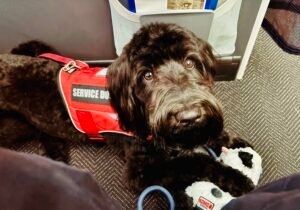
But we made it to London, safe and sound. As did The Luggage.
Chapter 2 — London Calling (and Battersea Barking)
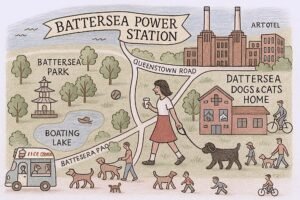
(featuring a sarcastic hotel, a saintly hotel, and one ecstatic dog reunion)
We made it through Animal Control and UK Customs (because technically I was “importing a dog”) and then came to the luggage. Loading the luggage cart I learned why people buy matching luggage sets: not for aesthetics, but so they’ll stack. Mine, unmatched, didn’t. They slipped and slid off one another, a slapstick routine performed by a middle-aged woman and her small dog after eleven hours in transit. Salvation came in the form of a strapping young Turkish man who simply refused not to help. Sutti licked his hand gratefully. I restrained myself, though felt the same sentiment.
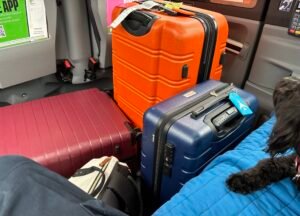
The plan was I’d take the Heathrow Express to Paddington, then a cab to the hotel. With the luggage teetering like a Greek tragedy on wheels, that fantasy died. Instead, luggage, dog, and middle-aged lady were deposited in a cab, all of us on our way to Battersea, the meter climbing with the slow, deliberate cheer of an IRS agent. By the time we pulled up outside the hotel, it had reached the dizzying height of £200, tip included. I passed the driver my credit card, feeling nothing but gratitude. He was, mercifully, a gem: part comedian, part tour guide. Sutti revived enough to watch the city go by; I was simply relieved we were moving forward.
Weeks earlier, in a fit of thrift, I pre-paid through Priceline for a room at Copthorne Tara Hotel in Kensington — part of the Millennium Hotel Group, a name that sounds like it ought to be respectable — labeled “service dogs welcome.” When I phoned the hotel two weeks before our scheduled arrival to let them know I’d be bringing a service dog, their response was pure theater of the absurd: “But you don’t sound blind.”
What, one wonders, is the correct sound of blindness? I didn’t ask. For the next two weeks, Copthorne Tara refused to return my calls, the manger is apparently only available five minutes on alternate Thursdays, while (who also claimed to be calling the hotel) Priceline put me through a daily ritual of hold music, repeated explanations, and hollow promises of a refund and of being called back.8They didn’t. I was assured of my value as more than twenty hours of my life disappeared into this void, and, like the $600, paid for my room, that time is never to be returned.
At some point, sanity prevailed and I realized that even at government wages my time has to be worth something. I abandoned both Priceline and the Millennium Hotel Group to their dodgy chorus and called AmEx Travel instead. They were everything the others were not: efficient, sympathetic, and slightly expensive, which at that moment felt like the most reasonable deal in the world. They booked us into the Art’otel in Battersea — chic, stylish, and part of the gleaming redevelopment of the long-abandoned Battersea Power Station. The great brick hulk with its four white chimneys — once a ruin fit for Pink Floyd album covers — now presided over shops, restaurants, and this astonishing hotel.

Inside, everything was design-magazine perfect. So dog-friendly, in fact, that I half-expected Sutti to be handed her own keycard while I was directed to the admittedly large and quite plushy cushion so she could have the king size bed.
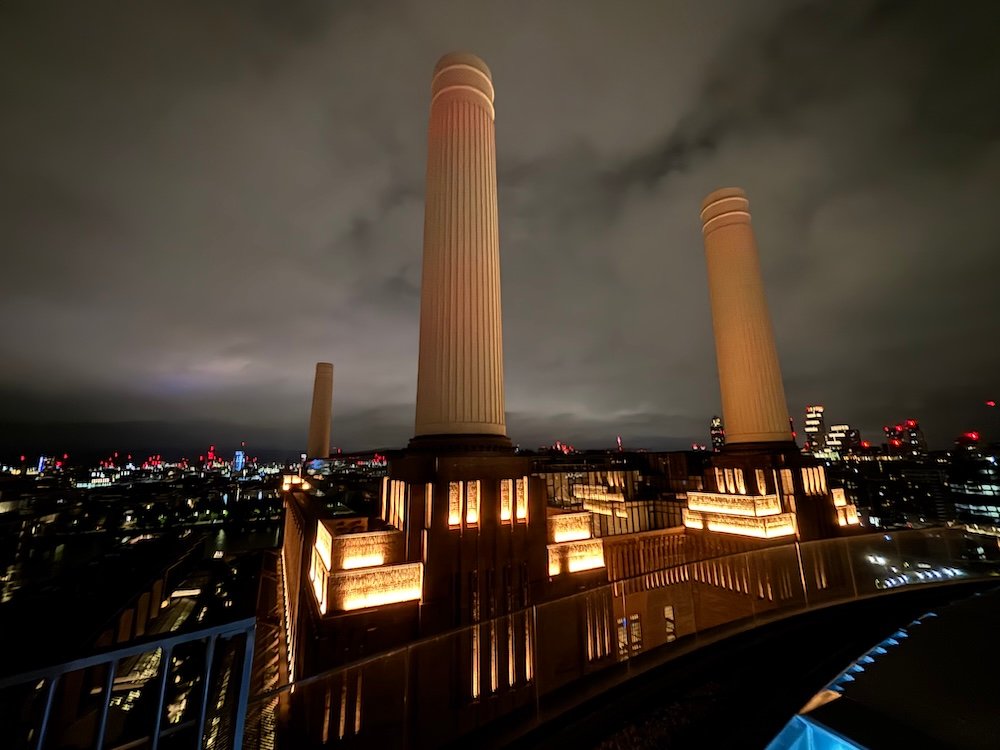
Then there was the pool. An infinity pool stretched across the roof, a glass ribbon hovering above London with a view of the Thames and the chimneys below. It was the most spectacular pool I have ever almost swum in. I admired it through a haze of exhaustion, promising myself a leisurely plunge, and then collapsed onto bed instead. Travel has its priorities, and mine at that moment was a shower and then a nap.
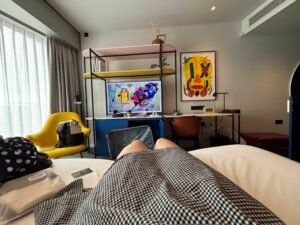
Except Small Dog had needs. And looked so tired and sad.
First things first: Sutti needed grass. After hours of refusing to eat, drink, or so much as blink at an airport relief station, she padded quietly at my side as we walked to the adjoining park by the Thames. Afternoon sunlight, water slipping past, London buzzing somewhere beyond — and Small Dog finally lowered her nose to the grass as if to say, Yes. This will do.
But she still wasn’t herself. She drank a little, but turned her head at food, and — most telling of all — she wouldn’t even play fetch. The ball sat ignored, the dog who normally quivers with anticipation simply curled closer to my legs, too tired to care. That, more than anything, gnawed at me. So I asked the hotel reception for advice. Without hesitation, they sent me next door — quite literally — to the Battersea Cat & Dog Home.
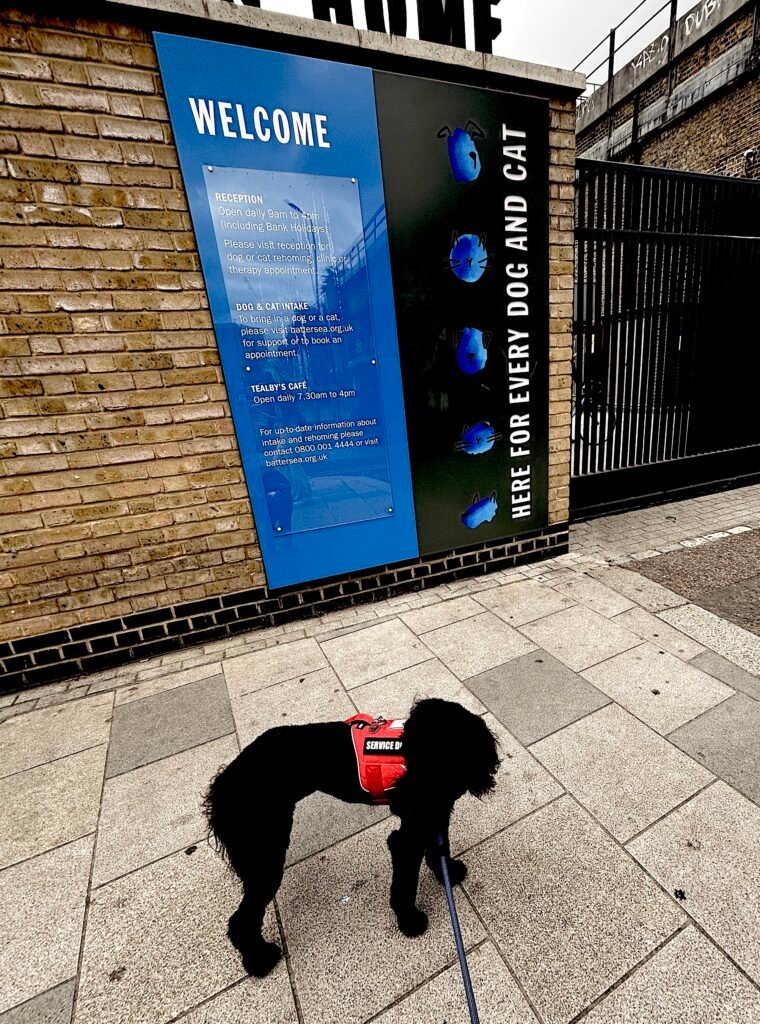
Late on a Saturday afternoon, I expected closed doors. Instead, within minutes, three women appeared at the gate: a vet and two assistants, brisk, warm, and radiant with kindness. They crouched to examine her, stroked her, cooed over her, and assured me she was simply exhausted by the journey. “Let her rest. She’ll be fine in the morning,” the vet said, handing me a number to call “just in case.”
They were right. By the next day Sutti was almost herself, and by evening she was incandescent. We were walking along the Thames, the pavement still damp from a brief rain, when she suddenly froze — head up, ears sharp, nose twitching. Then she spotted him.
Paul was only a blur at the far end of the walkway, but for her it was enough. The full-body wag began, rolling out from her tail until her entire frame quivered with triumph. She surged forward, not just joyful but proud — as if to announce to the whole of London: I’ve found him! He was lost, but I’ve done it. Case closed.9Based on her reactions and expressions it’s clear Sutti thinks we both very careless about wandering away when it’s so obvious to her that a pack needs to be within touching distance of her at all times. Or at least whenever she wants.
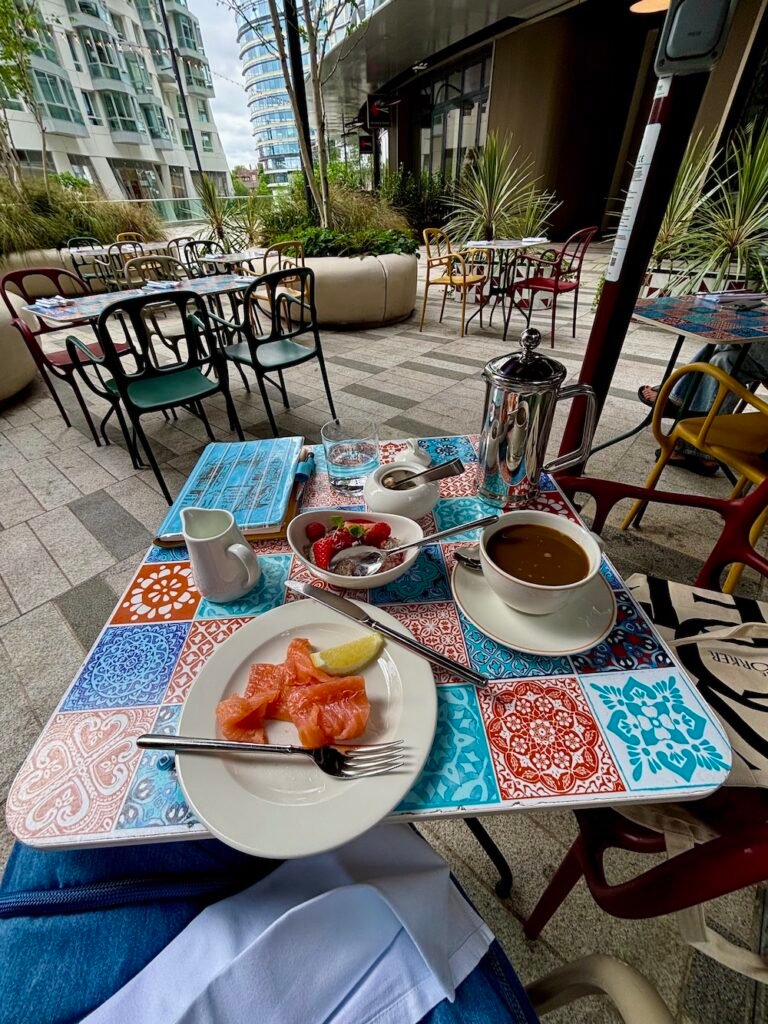
Watching her bounce with joy, her happiness at seeing him mirroring my own but expressed so beautifully, I felt every frantic phone call, every impossible suitcase, every meter tick of bureaucracy dissolve. For her, the search was over. For me, it was the moment the trip started to swing back from an ordeal to an adventure.
Those few days in Battersea made it my new favorite corner of London. The park stretched wide and green along the Thames, lively but never frantic, the kind of place where locals and tourists alike seemed softened by the air. We walked for hours and it wasn’t nearly enough. People stopped to greet Sutti everywhere — she took it as her due, of course, queen of Battersea in her first week abroad.
The Art’otel was as much part of the spell: its rooftop infinity pool hovering above the old power station chimneys, its staff treating us like honored guests (and Sutti like visiting royalty). Even the food was good — unfussy, exactly right. It was a pause, a breath, a reminder that sometimes a trip isn’t just about movement forward but about standing still in the right place long enough to exhale.
Chapter 3 — Wales: Dragons, Mumbles, and an Ikea with Roses
(or, how I learned that a garden centre can be a parallel universe)
From Battersea to Wales via Heathrow, with the Tube in between — and this was where my overpacking made itself known to Paul. Not just known, but noted. Crossly. We were late checking out, late on the Tube, late because my bags multiplied like Gremlins. He was justified.10I did pay a price and do intend to write about that, for those interested in such things at some point in the future..

Then came the car. I’d rented a compact electric SUV for the month, something modest enough for Welsh lanes. Avis, in their wisdom, “upgraded” me to a giant version — a barge (think Range Rover / Ford Explorer sized) disguised as a car. Paul was unimpressed. Not only did it require hunting for charging stations,11Which was interesting as I’ve never driven an electric before. I liked it though there were a few times I couldn’t tell when the car was on. but it also handled like a sofa on wheels. His patience, already thin from the luggage, began to fray a bit more.
I did take the wheel for an hour or so on the motorway between Heathrow and Swansea, gamely holding steady until the first unexpected roundabout. At that point, white-knuckled and rattled, I admitted defeat and pulled over. Paul took the wheel from there, navigating us into Swansea and through the impossibly narrow streets of Mumbles, where my “upgrade” felt less like a gift and more like trying to thread a sofa through a keyhole.
And yet, Mumbles worked its quiet magic. A village with a hidden castle, medieval streets scarcely wider than my car, and a rented house straight out of 1975. The widow of a Marxist scholar, the house had left everything just as it was: a dial microwave humming in the corner, no internet, no cell service, and books and albums, tapes and CDs everywhere. Not just on shelves, but in drawers, closets, stacked in precarious little towers that looked as if they’d been growing undisturbed for decades.
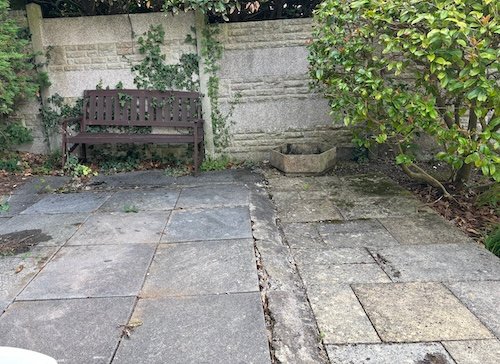
At first it was exasperating. Then, liberating. Offline, surrounded by relics of life lived at another rhythm, I felt something stir I hadn’t in years — the slow return of creative writing, not for work or deadline, but simply for pleasure. Of using my computer without my it being connected to or getting information from anyone or anything but me.
Wales started poorly for me. I didn’t realize, and thus didn’t convey to Paul how totally exhausted I was and my need to get oriented to where we were before venturing out to discover new places. Consequently I did not appreciate the beauty that was Tenby while we were visiting on a day trip. Mea culpa — it’s a gorgeous place and I hope I get to go back. Fortunately I did get to unwind… eventually.
Still, the best part of the weeks in Wales, though, wasn’t castles or cliff walks or even the strange liberation of living offline. It was seeing friends. My “women” friends.
Paul decamped for the North, leaving me in Mumbles on my own. Then a beloved friend I hadn’t seen except over FaceTime in at least fifteen years came to stay for a long weekend. She didn’t even bring her computer — a radical act in itself — and we both surrendered to the odd enchantment of the house.
Evenings stretched long: the two of us laughing late into the night, puzzling over the cooker, marveling at the microwave with its dials, and talking until the 1970s wallpaper seemed to fold time in on itself. Without Wi-Fi or distraction, the days were shaped by conversation, walks, and the comforting hum of old music from the stacks of CDs and tapes.
It wasn’t sightseeing that mattered. It was the sheer pleasure of being present with someone who knew me well, without hurry or interruption, in a house that insisted we live — for a while — at half speed.
Likewise, my first “long” solo drive — to and through Cardiff — brought me to the Blue Diamond Garden Centre, where I was meeting my first newgroup friend for tea. Tea, in theory. In practice, we sat down mid-morning and four hours later realized we had barely moved. Conversation unspooled as if we’d paused only yesterday, not fifteen years ago. We laughed, we remembered, we caught up until the years folded in on themselves.
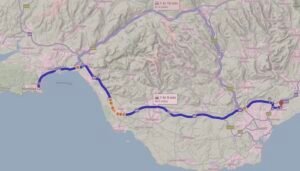
And the setting only added to the surreality. Blue Diamond was less a garden centre than a parallel universe: vast, bright, immaculate. Everywhere gleamed; everywhere beckoned. Roses here, Victoria sponge in the café there — improbable and yet entirely normal in context. It felt like we’d stepped sideways into a world where friendship and surreal retail collided — and somehow, it worked.
Chapter 4 — Ireland: Birthdays, Cake, and Calf-Length Skirts
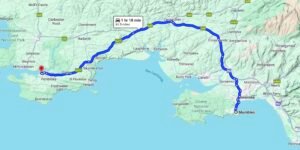
Eventually though it was time to leave. Closing up the Mumbles house, I tucked the key under the dustbin and drove west to Pembroke for the ferry.12One thing I discovered is that the location of ferry docks is kept way too vague.

Sutti and I crossed to Rosslare, then set out across Ireland — still driving on the left, still wrangling the upgraded SUV, but this time with less dread. Fields stretched wide and green, the road unspooling toward Limerick and what felt like the heart of the trip: my dad’s 80th birthday.

There was one moment, though, when my tiredness nearly undid me. I hadn’t slept the night before, and I wanted nothing more than to keep pushing west. But Sutti needed grass, so I pulled off by a castle — a proper medieval ruin rising out of nowhere — and let her out. We played a few minutes of fetch, her ears flying, the ball bouncing against stone. I felt myself wake, refreshed not just by air and movement but by the simple fact of pausing. The castle, the dog, the small reprieve: it was enough to carry me the rest of the way.
As we drove, another surprise. Near Tipperary, I began to notice blue and yellow everywhere — flags, bunting, shopfronts. By the time we reached town, it seemed the whole county had been dipped in paint. We’d stumbled into the aftermath of Tipperary’s upset victory in the All-Ireland hurling championship, and people were still celebrating. At a café, I asked what had happened; the owner not only explained, with pride, the ancient and brutal sport of hurling, but waved away the price of my coffee for the pleasure of telling the story. Days after the win, the air still vibrated with joy.
By the time we reached Limerick, I was more awake than I’d felt in weeks. The Savoy Hotel greeted Sutti as if she were a visiting princess. I, meanwhile, was simply grateful for comfort and family. My sister and her wife were there, my brother, his wife, their kids. We gathered around my dad, who was in his element — turning 80 with laughter, cake, and everyone he loved in one place.

The party wasn’t tied to the date. My dad actually turned 80 back in May, but 80 is a birthday too big for one day. It’s a milestone that deserves a season, a year, an era if necessary — and this was what he wanted: to be in Ireland with his children and grandchildren around him. Watching him revel, active and vibrant, felt like a triumph over history itself.
The unexpected jewel of Limerick was Fennessy’s, a school outfitter in full back-to-school frenzy. Parents and daughters jostled shoulder to shoulder, the air thick with polyester and the hum of impending term. Everywhere: calf-length pleated skirts, brilliant ties in dazzling colours, the murmur of mothers arguing over hem lengths, daughters rolling their eyes.
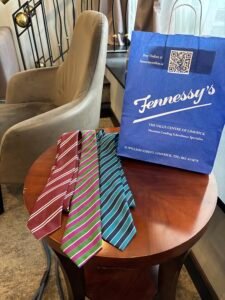
It felt like stepping straight into a Saint Clare chapter, though with rather more credit card receipts. I bought three ties without hesitation — irresistible splashes of colour, small treasures tucked into my bag, proof that even in the middle of family celebration and travel fatigue, whimsy still has its place.
Chapter 5 — The North: Hydra Luggage, Geordie Dogs, and Old Friends
(in which a friend adopts a suitcase and I fulfill a twenty-eight-year dream)
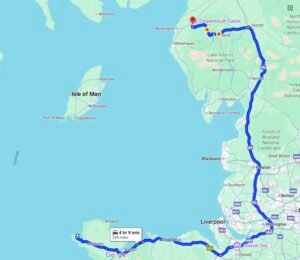
Back across the ferry, into the night, through the Lake District on lanes narrower than my nerves. I white-knuckled it until Cockermouth, improbably named and entirely charming, where a beloved friend was waiting. We had lunch that became four hours, the kind of conversation that folds time in on itself until the gap of years collapses. She even insisted on adopting one of my monstrous suitcases, promising to ship it later. as she ships clothing as part of her business When I told him, Paul was aghast that I’d have agreed to her doing that; to him, such things are unthinkable. To me, though, this is what friends do. Honestly, even if she never sends it, but sets everything on fire (or whatever) I’ll be forever grateful to have had it gone.
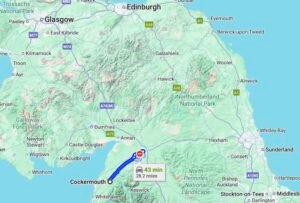
After lunch we drove for an hour and then I called Paul. Two days without sleep and a hard drive to Edinburgh for 12 hours in front of me before heading to Newcastle, all without sleep, seemed ridiculous. Irresponsible. I was so tired. So instead I drove Carlisle, stayed in a Premier Inn outside the city and slept. I woke feeling wonderful. It was almost my birthday and I was excited about it. It felt like it took no time to get to Newcastle and the train station where Sutti again found Paul (clever girl).
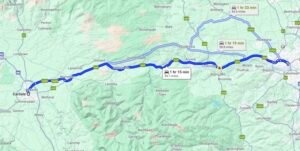
Sutti celebrated with a romp in Saltwell Park across the river in Gateshead where they have a great dog park. Her ears flying, tail like a metronome of joy. For the next two weeks, Paul and I explored castles and abbeys, rain sweeping over stone walls like part of the plan. One walk along the Tyne I’ll never forget: wind so fierce it blew Sutti’s ear straight back, her small body leaning forward into the gale as if determined to prove herself a true Geordie dog.
On my birthday itself, Paul drove us to Roseberry Topping, then to The King’s Head — the pub where I had once been with both his parents, long before. We lifted a glass to them, to the years between, to being there again. Later, we found the moorland village he had mapped as a boy, tracing lines from childhood into the present.
There were smaller joys too: fish and chips at Magpie Cafe in Whitby shared between us in salty, fried crispy perfection; multiple teas at Lewis’, at Marks & Spencer, and at Tesco — which more than held its own. At M&S, I tucked gingham school dresses into my bag, small tokens folded into the larger story. Toward the end of my trip we circled back to Paul’s home where we wandered the pre-Norman churchyard in Norton, where his mother and grandmother, with quiet omniscience, keep track of who attends services.
Chapter 6 — Whitby: The Perfect Day
We had planned to end the trip at Northgare, but Whitby insisted on having its moment. The town was crowded, tourists pressed shoulder to shoulder, but the sea was bright, the harbour alive, and I was relaxed enough to let Whitby have its day, trusting Northgare will still be there next time I came.
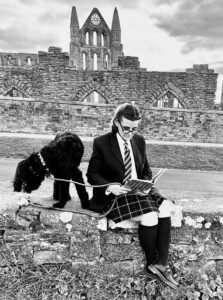
I wore my new Scottish school uniform all day, through the streets, the harbour, the steps — to the bemusement of half the town. It wasn’t costume, but triumph: a dream decades in the making, finally lived. People stared; I didn’t care. At 58, it’s oddly satisfying to be the one shocking the goth kids on the abbey steps.
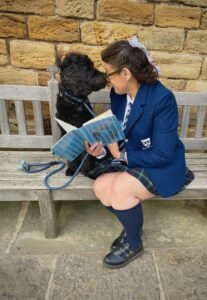
Paul, very sweetly, took dozens of photographs of me in my uniform, somehow managing to capture one or two where I’m not giving my trademark constipated smirk. The fact that so few people appear in the backgrounds is down to his timing, not chance — a small miracle, given how thronged Whitby was that day.
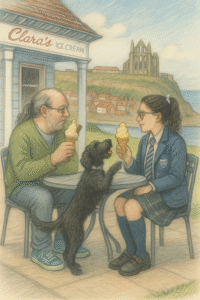
We ended, as all seaside days should, with ice creams: a proper 99 for Paul (“because the North remembers”) and a lemon top for me. Sweet, silly, perfect. Whitby became the full stop to the whole northern chapter: noisy, crowded, ridiculous, and exactly right.
Chapter 7 — Back to London, Bags in Tow
(the Tube of Doom, Hilton heaven, and the world’s worst Uber “Pet”)
Eventually, it was time to turn south. Newcastle gave way to trains, trains gave way to the Underground, and I found myself once more wrangling suitcases, backpack, and dog into the Tube at rush hour. By then I’d already shipped the two giant monsters home, thinking I had finally outwitted the Hydra. But of course, it only sprouted anew: the morning I left, I had to buy a second small rolling bag — caught between the logic of things that could only be checked and things that could only be carried on.
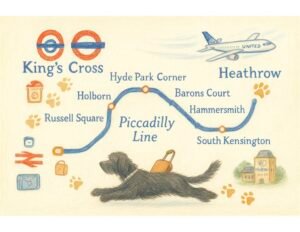 So there I was, with two rollers, a backpack, and one small dog at King’s Cross. It was over 80 degrees, airless, crowded, and there was no space on the floor for Sutti without risking her being stepped on or crushed. So she sat on my lap instead, a furry backpack of disapproval, while I tried to balance bags, dignity, and the patience of strangers. The Hydra, true to form, shifted, slid, and threatened to topple into commuters. If it had grown heads in Long Beach, by London it was on a rampage.
So there I was, with two rollers, a backpack, and one small dog at King’s Cross. It was over 80 degrees, airless, crowded, and there was no space on the floor for Sutti without risking her being stepped on or crushed. So she sat on my lap instead, a furry backpack of disapproval, while I tried to balance bags, dignity, and the patience of strangers. The Hydra, true to form, shifted, slid, and threatened to topple into commuters. If it had grown heads in Long Beach, by London it was on a rampage.
And then, salvation. United delayed my flight13This is complicated. They actually delayed Sutti and me, but it’s so convoluted, let’s just go with flight delay., which at any other point might have broken me. Instead, it handed us a night at the Hilton at Heathrow’s Terminal 4 — the very same hotel Paul and I had stumbled into as broke graduate students decades earlier. Then it had seemed magical. Now it was nothing short of miraculous.
For an airport hotel, it had everything you don’t expect: a garden to walk in, a hush that wrapped itself around you, and the most wonderful staff — genuinely warm, as if they’d been waiting all day just to welcome a tired traveler and her small dog. They adored Sutti, of course, treating her with the kind of natural ease that made it feel as if she belonged there more than I did.
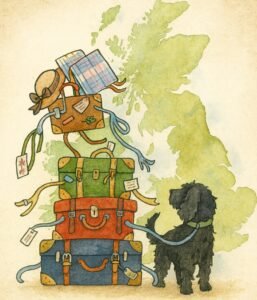
And then there were the small mercies: tea-making supplies with biscuits in every room, a plug exactly where I needed it, and — joy of joys — an American-style ice machine humming on the floor. I could have wept with happiness. After weeks of ferries, castles, suitcases, and bureaucratic gauntlets, the Hilton was a benediction.
It should have been the perfect note to end on, and almost was — until Uber “Pet.” One evening I booked a ride to take us to a nearby park. The driver was happy enough to deliver us there, but when I called for the return trip, the next driver refused unless Sutti rode in the trunk. Reader, she did not. There was no walking back — too far, too late — so I stood on the pavement, incredulous, while Uber dithered and sent another car eventually. A final comic trial: proof that while kindness turns up in the oddest places, so does idiocy.
Epilogue — Saints, Suitcases, and Simplicity
July through mid-August was a saga: castles and ferries, Marxist cottages and Hilton ice machines, suitcases sprouting like a Hydra, and friends who folded the years as though they were nothing at all. I came home with treasures, memories, and one new conviction: simplicity really is kind to my brain — though I’ll probably ignore that next time.
What struck me most wasn’t the castles or uniforms, but the way true friendships endure. Three different times, I sat down with people I hadn’t seen in more than a decade and felt time collapse in an instant. We laughed as if no years had passed, though of course we carried new layers now — AuDHD, ADHD, grief, survival, joy. Such friendships don’t fade; they wait, patient as saints, until we are ready to arrive again.
And the slowing down mattered too. In Wales, offline in that 1975 cocoon, creativity stirred for no reason other than pleasure. In Ireland, a castle stop for Sutti to find grass gave me back my breath. In the North, “teas” at Tesco and M&S were as restorative as abbey ruins. In Whitby, I wore my uniform all day, bemusing goths and delighting Paul, who took dozens of photographs until he finally caught me without my constipated smirk. At 58, I discovered it’s still possible to surprise yourself — and sometimes others, too.
Sutti was, of course, the true heroine: approved by Heathrow against all odds, patient through ferries and roundabouts, triumphant in every reunion. Proud as any detective who has solved the case, she found Paul not once but twice, glowing with joy. She charmed strangers across three countries, every bit as wonderful as I always insist she is.
Miss Clark would scold me for not making a packing list. Miss Kelley would assign fifty lines on the perils of excess luggage. And I would smile, because the truth is, we survived — and more than that, we lived.
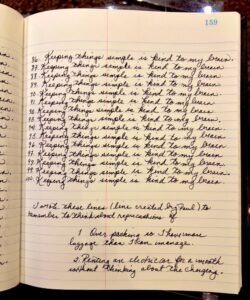
What I remembered, somewhere between abbey ruins, lemon-top ice creams, Marxist microwaves, and Hilton gardens, is that it is possible to relax. To be unplugged. To be creative for pleasure, not reaction. To have days without my phone giving me any news, without checking any email. Have time to create, rather than constantly react and respond. To notice the small things, and to let friendship, loyalty, and laughter carry the weight.
If that isn’t simplicity, it is at least enough. For now. Cheers — to friends, kind strangers, small dogs, and the kind of stories that remind us to slow down.
And with that, I’m looking ahead to my long-delayed 2026–2027 sabbatical. If this trip taught me anything, it’s that sometimes the real adventure isn’t in going further, but in learning how to pause long enough to notice where you are.
- 1Turns out those were for her health. Heathrow needed to document *mine.* This had not been mentioned prior. Sigh.]
- 2Businesses that had opened all had mostly closed by 12PM.
- 3Real calls. Like where I dialed and talked to people. People I didn’t know and weren’t expecting my call. Who were really helpful.
- 4Okay, but I didn’t know that’s where he was. Or why.
- 5I was also extremely fortunate that my employer had had me document Sutti’s training, skill, and my need for it so I already had letters from my doctors testifying to my CPTSD, severe anxiety, and panic disorder. So I guess I should thank my university’s HR office. Someday.
- 6It was pointed out to me, that there was another choice. Bring nothing and buy the things I needed. Sensible in retrospect and would have proved far cheaper in the end, but I’m not lying when I say it never crossed my mind. Surprised?
- 7To be fair to myself one contained a 20 pound bag of Sutti’s Very Special Food (sold in the UK it turns out) and all her toys and stuff.
- 8They didn’t.
- 9Based on her reactions and expressions it’s clear Sutti thinks we both very careless about wandering away when it’s so obvious to her that a pack needs to be within touching distance of her at all times. Or at least whenever she wants.
- 10I did pay a price and do intend to write about that, for those interested in such things at some point in the future..
- 11Which was interesting as I’ve never driven an electric before. I liked it though there were a few times I couldn’t tell when the car was on.
- 12One thing I discovered is that the location of ferry docks is kept way too vague.
- 13This is complicated. They actually delayed Sutti and me, but it’s so convoluted, let’s just go with flight delay.
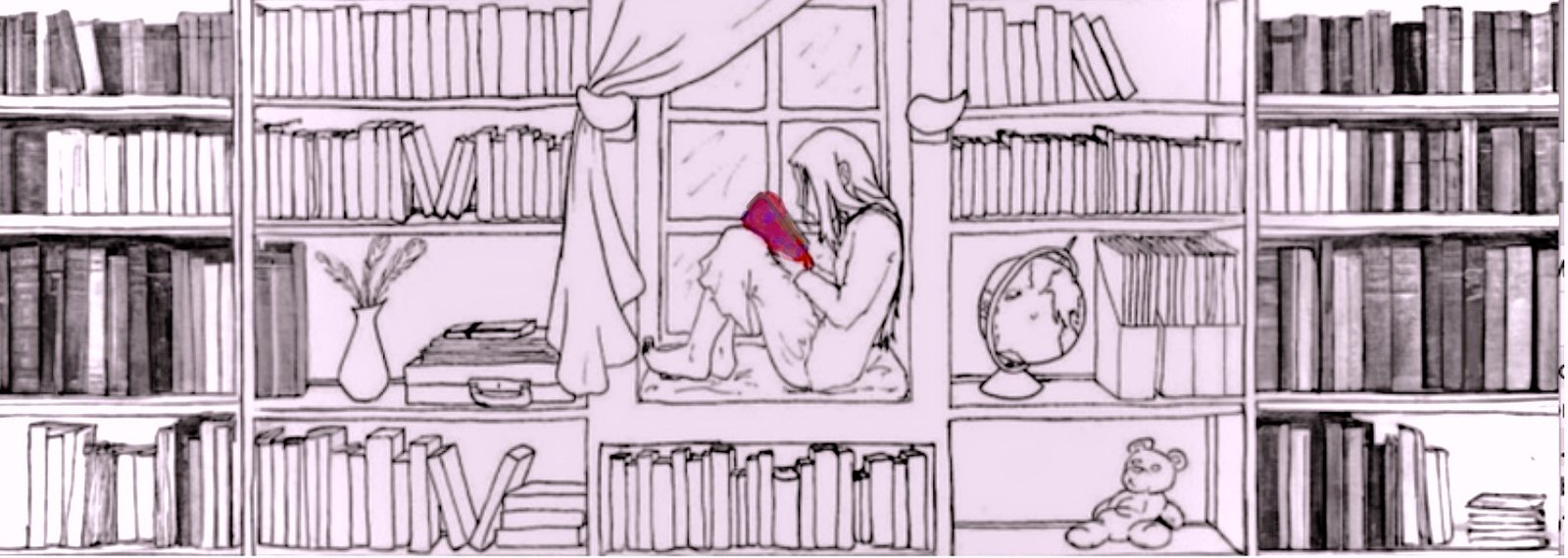
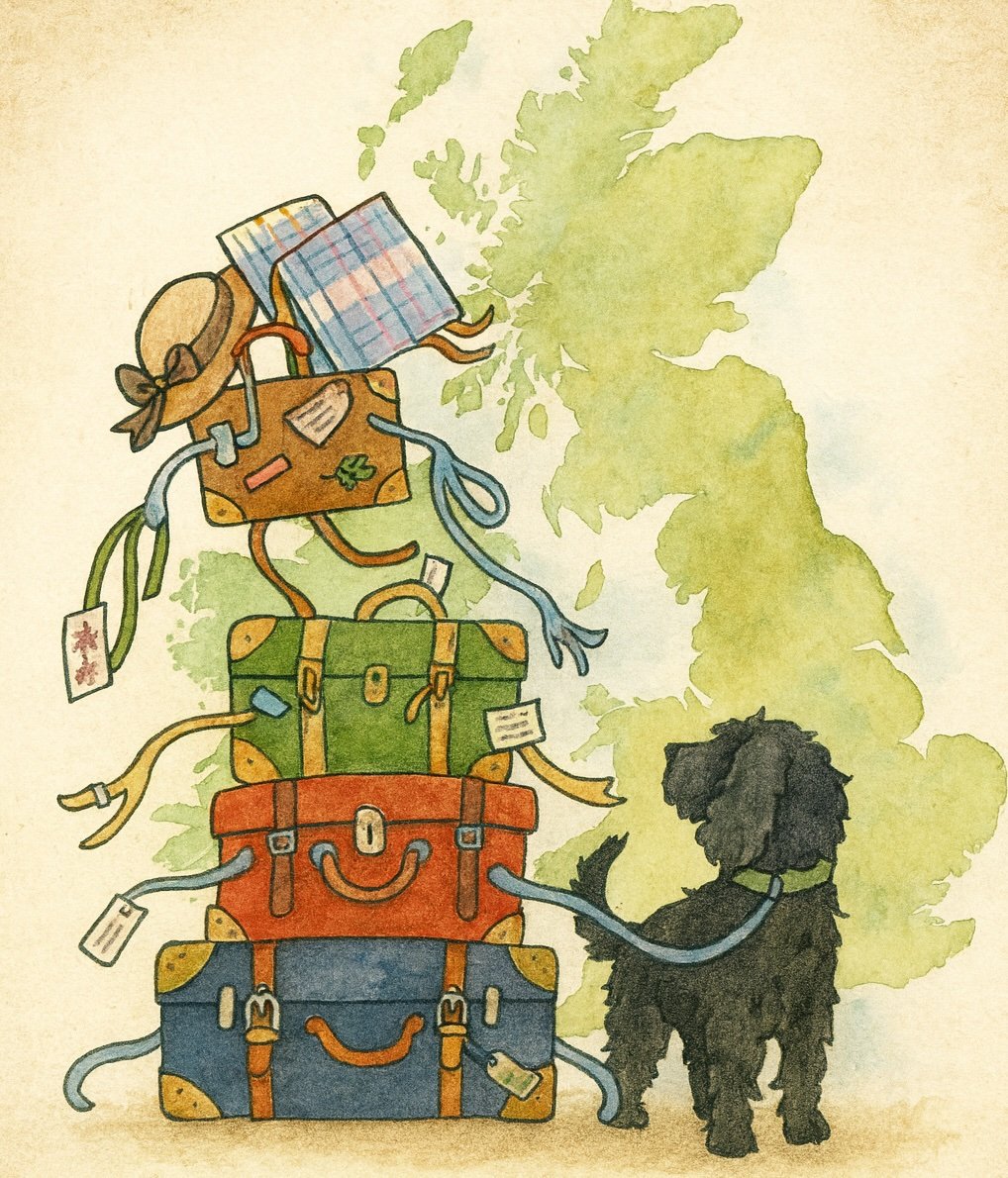
What an engaging, thoughtful, stirring, entertaining and satisfying memoir (one can hardly call it a mere travelogue). And the illustrations are beyond charming. (A visual artist as well as writer. You have my envy.)
I thoroughly enjoyed reading this. It made me long to return to Ireland, sharpened my interest in visiting Wales and made me think “well, perhaps there is SOMEWHERE in England itself I might be willing to visit,” as you made Battersea sound so inviting. That you could induce me into even thinking about a visit to :::Fenian shudder::: England is a testament to your powers of description.
Thank you! It was fun to write. The luggage saga, unfortunately, continues. The shipper I used (not my friend) works through FedEx who have somehow lost a 50 pound brick red suitcase, though their tracking shows it made it to Los Angeles so now I have the itemize contents. 😱 They include a lot of uniform stuff, which is really sad. But I can’t believe they won’t locate the bag. I’m just so annoyed I couldn’t get the AirTag I’d planned to use for that case working before I sent it.
Amazing journey! Amazingly well written! Amazing to have traveled with Sutti from the US to the UK. How did you have then accept Sutti as a Service Dog?
Bravo and compliments!
B xx
Thank you — I’ve always kept journals, actually all in one big one — that’s where the lines were written, of my trips to the UK. Sometimes, mostly because of time, with more detail than others, making little drawings and gluing in scrapbook stuff. I knew I wanted to do it digitally this time so I also had an ongoing document. There were so many wonderful and not-so-wonderful moments I left out, including the stuff connected to my new uniforms and spankings that I think deserve their own posts. As ever, that will be when I get around to it.
Now for the practical end of things. The US laws around service dogs are much looser than in the UK – where they’re called “assistance dogs.” There’s a British organization, Assistance Dogs UK, that has a centralized standard of training with member organizations and trainers that are recognized as training to this standard.
Sutti is a trained service dog — Paul and I worked with a dog trainer so she’s got both the advanced public access skills and the specialized skill training to alert me when she senses I’m about to have a panic attack so I can take a step back and change the way I’m breathing and such.
Because the UK is an island that doesn’t have rabies, they have very strict rules related to proving the health of dogs coming into the country. That requires records of vaccinations connected to the dog’s microchip, attested to by a vet who’s got specific FDA certifications. It also requires dogs to be “de-wormed” (whether they have worms or not) not more than five days and less than 24 hours before the dog enters the UK. I had paperwork for all of the above.
However, the UK requires dog flying in to arrive as cargo, not in the cabin. I’m not sure why, but that’s the rule. There is an exception made for certified assistance dogs who are allowed to fly in the cabin with their handler. To prove that the dog is an assistance dog for a specific passenger, they need training records, evidence of the handler’s disability, and that the dog was recommended by a doctor as part of the treatment of the condition. This was the part that United let me know I needed.
Fortunately my employer had needed those same things for me to bring Sutti to campus and have her with me during my classes. So I had the stuff to send. The one gap was that Sutti’s trainer is not recognized by the UK assistance dog organization — which was why I had to pay the 447 pounds. Next time I go to the UK I plan to have her tested so she’s an “official” assistance dog for the UK as well.
Paul pointed out I wrote it with the thought the luggage was the kind of the through line for the piece, but really, it’s Sutti. Still, I’m not about to re-write it.
You must have had special training for dealing with admin red tape…
You’re a college prof, it explains the great writing…
Unfortunately, English is my second language…
And I have the illustrations !
B xx
You must have had special training for dealing with admin red tape…
You’re a college prof, it explains the great writing…
Unfortunately, English is my second language…
And I have the illustrations !
B xx